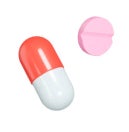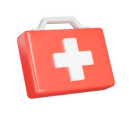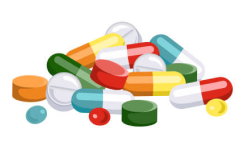Uses
What is Mucolytics and Expectorants for?
Mucolytics and expectorants are a group of medications that work by thinning and loosening mucus in the airways, helping to clear chest congestion thus making breathing easier. Common examples of expectorants include Guaifenesin and Ammonium chloride. Common examples of mucolytics are Acetylcysteine, Ambroxol, Bromhexine, and Carbocisteine.
How should I take or use Mucolytics and Expectorants?
- Take these medications as recommended by your healthcare professional. Consult your healthcare professional if you are not sure how to take these medications correctly.
- Some of these medications should be taken after food e.g. Ambroxol. Others such as Acetylcysteine and Bromhexine may be taken with or without food.
- For syrups, shake the bottle well before use.
- For effervescent tablets and sachets, completely dissolve one tablet or the recommended amount of sachets in at least half a cup of water.
- If your symptoms persist or worsen after one week of taking these medications, please talk to your healthcare professional.
What should I do if I forget to take or use Mucolytics and Expectorants?
Mucolytics and expectorants may be taken when required for a short period of time. This means that you do not have to take them if you do not have any symptoms. If you miss a dose, take it as soon as you remember. However, if it is almost time for your next dose, skip the missed dose and continue normally. Do not take two doses or extra medication to make up for the missed dose.
Precaution
What precautions should I take when taking or using Mucolytics and Expectorants?
Inform your healthcare professional if:
- You are allergic to mucolytics and expectorants, or any other ingredients used in these medications.
- You are taking any other medications, including supplements, traditional medications and herbal remedies.
- You have existing conditions such as gastric ulcers, liver or kidney problems and lung conditions e.g. Chronic Obstructive Lung Disease (COPD) or severe uncontrolled asthma.
- You are pregnant, planning to become pregnant or breastfeeding.
- You have a cough with thick yellow or green phlegm or mucus, or blood.
- You have a fever of more than 38.6oC.
- You lose weight even though you are not trying to do so.
- You have night sweats.
- Your cough lasts for more than 3-4 weeks.
- You start having new symptoms during self-treatment.
What food or medication should I avoid when I take or use Mucolytics and Expectorants?
Let your healthcare professional know if you are taking, or planning to take any other herbal products, supplements, or medications.
Side Effects
What are some common side effects of Mucolytics and Expectorants?
- Some expectorant products may cause drowsiness or dizziness.
- Avoid driving, operating machinery or other activities which require concentration if affected.
- Common side effects may include nausea, vomiting and abdominal pain.
- These side effects are usually mild and will pass quickly.
What are some rare but serious side effects that I need to seek medical advice immediately?
The symptoms of a drug allergy include one or more of the following:
- Swollen face/eyes/lips/tongue
- Difficulty in breathing
- Itchy skin rashes over your whole body
If you experience any of these symptoms, you should stop these medications and see your doctor immediately.
Handling
How should I store Mucolytics and Expectorants?
Store in a cool and dry place away from direct sunlight. Keep these medications away from children.
For syrups, discard the bottle 6 months after opening or if expired, whichever is sooner.
How do I throw away Mucolytics and Expectorants safely?
Pack these medications into a black trash bag and seal it tightly before throwing it into the rubbish chute or bin.
Disclaimers
Please take note that the above is not a complete list of all possible side effects. If you have any concerns about your medication or if you have other side effects that you think are caused by this medication, please consult your doctor or pharmacist.
If you take more than the recommended dose, please seek medical advice immediately. The information provided on this page does not replace information from your healthcare professional. Please consult your healthcare professional for more information.
This article is jointly developed by members of the National Medication Information workgroup. The workgroup consists of cluster partners (National Healthcare Group, National University Health System and SingHealth), community pharmacies (Guardian, Unity and Watsons) and Pharmaceutical Society of Singapore. The content does not reflect drug availability and supply information in pharmacies and healthcare institutions. You are advised to check with the respective institutions for such information.
Last updated on September 2024

Need More Medicine?
Use Medicine Order Service on HealthBuddy.

Medicines Reminder
Get reminders and chart progress on HealthBuddy.
Related Medicines or Drugs

















